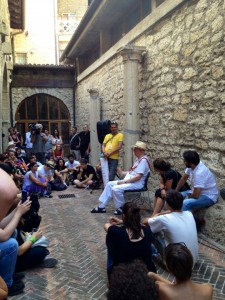Scaffolding learning with and about technology
Last week we were in Cadiz at the European Conference on Educational Research. Amongst other things, we produced three live half hour radio programmes and I will upload the podcast copies in the next two days.
Today we had an online meeting of the UK Nominet Trust funded RadioActive project. This is a great new project, using Internet radio to work with young people in Hackney in London. the idea is for them to produce their own programmes, about whatever topics interest them. And in the course of the project we hope they will learn a series of different skills and competences, including interviewing, multimedia, producing and editing music etc.
The grant included funding for equipment, which we bought at the start of the work. Of course, we wanted to make sure we had all the equipment we might need in the course of the two year project (we will post this up soon in case anyone is interested). We adopted a cascade model for training, with Pontydysgu running a two day workshop for youth workers who would be working with the young people. Of course we wanted to show the best that could be done wit such equipment, using wireless microphones, a portable mixing deck and an Apple computer to broadcast a half hour radi0 programme. Although I was not there, by all accounts the workshop was a great success.
The idea was the youth workers would follow up by running their own workshops with young people. But as sometimes happens, contracting issues crept in to delay the live launch. And by the time we were ready for working directly with young people, the youth workers were not confident about using our advanced ‘outside broadcast’ radio set up.
Although we had taken a lot of trouble to design the workshop to scaffold the learning process around skills and competences such as interviewing and designing and producing media, in the course of today’s meeting it became apparent that we had failed to scaffold the learning around the technology.
This afternoon I did a one hour on line training session (using Skype) for one of the project staff. Instead of setting up the mixing deck and wireless microphones, we started simple, using just a USB microphone plugged directly into a computer and focusing on a number of simple first steps:
We did 3 things:
- We used GarageBand to record and edit a short voice input (if there had been more people this could have been an interview)
- We made a simple jingle mixing a GarageBand loop with a voice over
- We downloaded a Creative Commons licensed track from jamendo.com and edited it in Garageband to make our intro music for a programme.
We exported all of these to iTunes and then dragged them onto Soundboard. Sadly we did not have the server settings for Nicecast but if we did we could have then instantly broadcast a programme.
Now I am thinking how we can build a series of activities which both scaffold the content of what we are doing but also scaffold the technology which we use.
Of course I should have done this when we started, but I think it is indicative of a wider problem. We have been working in several projects using Web2.0 technology and social software with teachers and trainers. I think we can get over excited about the possibilities such applications offer. Then instead of focusing on the subject or topic of the learning, learning about the technology overwhelms everything else. I had a conversation with Jenny Hughes some time ago about this and she suggested (if I remember correctly) that we have a develop a dual system of scaffolding – one for the subject and a second for the technology. Of course these two scaffolds will overlap at some point.
I have seen a number of attempts to develop schema or even applications which suggest the best software or apps for any particular learning task but am unconvinced they work or even that this approach is possible. In most cases there will be many different technologies which could be used. I am far more impressed by the format and structure adapted by the Taccle2 project, in which Pontydysgu are a partner. This project focuses directly on teaching and learning and the technology is an enabling factor, rather than the ’50 great apps for learning’ approach so prevalent today.
i will write more on this but would be interested in any feedback / ideas.


